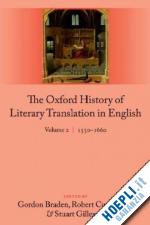THE OXFORD HISTORY OF LITERARY TRANSLATION IN ENGLISH General Editors: Peter France and Stuart Gillespie This groundbreaking five-volume history runs from the Middle Ages to the year 2000. It is a critical history, treating translations wherever appropriate as literary works in their own right, and reveals the vital part played by translators and translation in shaping the literary culture of the English-speaking world, both for writers and readers. It thus offers new and often challenging perspectives on the history of literature in English. As well as examining the translations and their wider impact, it explores the processes by which they came into being and were disseminated, and provides extensive bibliographical and biographical reference material. In the period covered by Volume 2 comes a drive, unprecedented in its energy and scope, to bring foreign writing of all kinds into English. The humanist scholar depicted in Antonello's St Jerome, the jacket illustration, is one of the figures at work, and one of the most self-conscious and prolonged encounters that took place was with the Bible, a uniquely fraught and intimidating original. But early modern English translation often finds its setting within far busier scenes of worldly life - on the London stage, as a bid for patronage, for purposes polemical, political, hortatory, instructional, and as a way of making a living in the expanding book trade. Translation became, as never before, a part of the English writer's career, and sometimes a whole career in itself. Translation was also fundamental in the evolution of the still unfixed English language and its still unfixed literary styles. Some translations of this period have themselves become landmarks in English literature and have exercised a profound and enduring influence on perceptions of their originals in the anglophone world; others less well-known are treated more comprehensively here than in any previous history. The entire phenomenon is documented in an extensive bibliography of literary translations of the period, the most comprehensive ever compiled. The work of our early modern translators, with all its energy, is not always scholarly or even always convincing. But after this era is over English translation never again feels quite so urgent or contentious.











